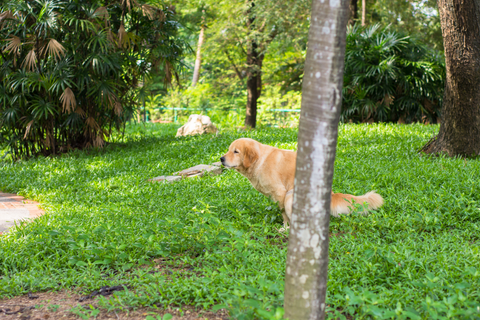What Can Give my Dog Diarrhea?

Every dog owner knows the dread of realizing their beloved pet is suffering from diarrhea. It's a common question: What can give my dog diarrhea? This issue can cause discomfort for both the dog and the owner, prompting an urgent search for solutions.
Common Causes of Diarrhea in Dogs
What can give my dog diarrhea? Diarrhea in dogs can be triggered by various factors, as explains PetMD, from dietary indiscretion (like raiding the trash) to infections and chronic health conditions.
Stress, changes in diet, and ingesting toxic substances can also lead to this uncomfortable condition. Identifying the cause is the first step to treatment.
Home Remedies for Dog Diarrhea
When facing mild cases of diarrhea, you might wonder, what home remedy can I give my dog for diarrhea?
1. Ensuring Hydration
One of the primary concerns when a dog has diarrhea is the risk of dehydration. Diarrhea can lead to a significant loss of fluids and electrolytes, so it's crucial to ensure your dog has constant access to fresh water.
To encourage drinking, you might place several water bowls around the house or offer ice cubes as a novel way for them to hydrate.
In cases of severe dehydration, your veterinarian may recommend electrolyte solutions or subcutaneous fluids to help replenish lost fluids and minerals.
2. Bland Diet: Boiled Chicken and Rice
A bland diet is often recommended to help soothe a dog's upset stomach and firm up stools.
Boiled chicken (skinless and boneless) and white rice are easy on the digestive system and provide a source of easily digestible nutrients.
Start with small, frequent meals to avoid overwhelming the stomach. As your dog's condition improves, gradually reintroduce their regular diet by mixing it with the bland diet and slowly increasing the proportion over several days.
Check out: Easy Homemade Dog Food with Chicken Recipe for Healthy Pups!
3. Including Probiotics in Their Diet
4. Adding Pumpkin to Their Diet
Each of these remedies can be effective for managing mild cases of diarrhea in dogs. However, it's essential to monitor your dog's condition closely and consult a veterinarian if the diarrhea persists for more than a day or two, is accompanied by other symptoms (such as vomiting, lethargy, or loss of appetite), or if you suspect your dog has ingested something toxic.
What Can I Give My Dog to Stop Diarrhea Fast?
For those asking, "What can I give my dog to stop diarrhea fast?" certain over-the-counter medications like Pepto-Bismol or Imodium might be recommended.
However, it's essential to consult with your veterinarian before giving your dog any medication. They can advise on the correct dosage and whether these remedies are suitable for your dog's specific situation.
Preventing Diarrhea in Dogs
Preventing occurrences that lead to the question, "What can give my dog diarrhea?" involves regular veterinary check-ups, a balanced diet, and avoiding feeding your dog table scraps. Additionally, managing your dog's stress levels can help maintain their overall digestive health.
Understanding what can give your dog diarrhea is the first step toward preventing and treating it.
While home remedies can provide relief for mild cases, it's always best to consult a veterinarian if you're unsure or if the symptoms persist.
Remember, a healthy dog is a happy dog.
FAQ

What Foods Give Dogs Diarrhea?
Some of the foods which can lead to diarrhea in dogs are:
- Dairy Products: Dogs often lack the enzyme to properly digest lactose, leading to diarrhea.
- Fatty Foods: High-fat content can be difficult for dogs to digest and may trigger pancreatitis.
- Chocolate: Contains theobromine, toxic to dogs, causing diarrhea and more severe symptoms.
- Artificial Sweeteners (e.g., Xylitol): Can cause hypoglycemia, liver failure, and diarrhea.
- Grapes and Raisins: Toxic to dogs, potentially leading to kidney failure and diarrhea.
- Onions and Garlic: Can cause gastrointestinal irritation and potentially lead to anemia.
- Spoiled or Moldy Foods: May contain toxins or bacteria, leading to food poisoning and diarrhea.
- Raw Meat and Eggs: Risk of Salmonella and E. coli, which can cause diarrhea and vomiting.
- Caffeinated Beverages: Can lead to diarrhea, restlessness, and heart palpitations.
- Avocados: Contain persin, which can cause diarrhea and vomiting in some dogs.
Check out: The Raw Truth About the Raw Diet for Dogs
Should I Feed my Dog if He Has Diarrhea?
Yes, you should. If your dog has diarrhea, offer a bland diet (like boiled chicken and rice) in small, frequent meals after a 12-24 hour fasting period to rest their stomach.
Always ensure they have access to clean water to prevent dehydration. However, consult your veterinarian for personalized advice, especially for prolonged diarrhea or other concerning symptoms.






Leave a comment